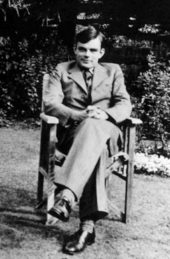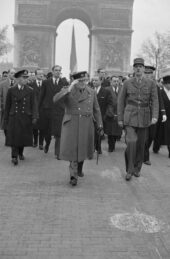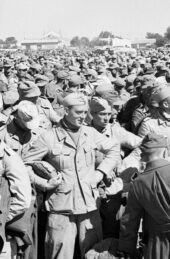“The atomic clock ticked faster and faster. We may anticipate a state of affairs in which two great powers will each be in a position to put an end to the civilisation and life of the other, though not without risking its own. We may be likened to two scorpions in a battle, each capable of killing the other, but only at the risk of his own life… This prospect does not make for serenity.”
So wrote one of the greatest American scientists, Robert Oppenheimer, in the journal Foreign Affairs, which appeared – after being cleared by White House officials in the Truman administration – in the summer of 1952.
It may also have sealed his fate. Leading Americans were not supposed to talk like that in those days.
When the Eisenhower administration took office in 1953, Oppenheimer – then a the height of his worldwide reputation – was not reappointed as consultant to the Department of Defense and his nemesis, Lewis Strauss (pronounced ‘Straws’), was appointed to chair the Atomic Energy Commission, the AEC.

Oppenheimer and Einstein in 1950
One of the first things he did was to ask for the security file on Oppenheimer. Oppie was still a consultant to the AEC, much to the rage of Strauss and some of the more gung-ho USAF officers – though he had only billed for six days over the previous year.
Four days later, Strauss moved to remove all the classified documents still in Oppenheimer’s possession in Princeton.
That autumn, Robert and Kitty Oppenheimer went to London to give the Reith lectures on the BBC and then on to Paris. When he reached home again before Christmas, there was a message waiting for him to call Strauss.
What had happened was that one of the USAF officers, William Borden, had devoted a great deal of time to going through Oppenheimer’s FBI file. Borden had flown bombers in the war and had once seen a V2 rocket pass him – it was an experience he was never to forget: the combination of rockets and nuclear weapons.
After the war, he wrote a book called There Will Not Be Time. As assistant to the chair of the Joint Committee on Atomic Energy, he had also become obsessed with what he saw as Oppenheimer’s intransigence.
Encouraged by Strauss, his letter to the FBI detailed all their suspicions about Oppenheimer.
In early December, Strauss had taken Borden’s letter to Eisenhower. The president responded by ordering a blank wall between Oppenheimer and any more secret information, until he could be cleared.
A week later, the FBI delivered a 30-inch-thick file on Oppenheimer. The result was a list of 28 charges against him – some of them true, some of them false – and most of them about things that had been long since investigated in the past. But the last four were an accusation that he had tried to delay work on the H-bomb after the war.
Oppenheimer first confronted his accusers about this when they met at the headquarters of the AEC at 3.30pm on Monday 21 December 1953. Strauss also had with him the AEC’s general manager, General Kenneth Nichols – who had been General Groves’s deputy at the Manhattan project, who he must have believed he knew well.
Strauss told Oppenheimer that he had been forced to reassess his background under an executive order from Eisenhower about the loyalty of federal employees.
He handed over an eight-page letter, setting out the charges against him. They included his brother’s membership of the communist party. Also, that he had tried to stop and delay the development of the H-bomb.
What could he do? He could just resign, which he assumed must be what they wanted, but that would be regarded as an admission of guilt – or he could request a hearing. He said he would decide later.
From the AEC offices, he went straight round to his friend, the lawyer Joseph Volpe, AEC’s former general counsel. He also went to see his old friend Herbert Marks, who was currently AEC’s general counsel. He decided he could not simply resign.
“This I cannot do,” he wrote. “If I was this unworthy, I could hardly have served our country as I have tried, or been the director of our Institute in Princeton, or have spoken, as on more than one occasion I have found myself speaking, in the name of our science and our country.”
The AEC hired an aggressive young lawyer, Robert Robb, with a reputation for cross-examination. For Oppenheimer, Volpe found the distinguished civil liberties lawyer Lloyd Garrison – though both Marks and Kitty felt they really wanted someone with more trial experience. But Garrison promised to find someone. In the end, he couldn’t.
As the time for the hearing approached, it was clear that Robb and the three-man board were ensconced together rather a lot. “Can I come too?” asked Garrison. Nichols said, “No.”
Oppie’s legal team were constantly told that this was not a trial or a court of law — so the usual arrangements did not apply. Equally, though, because he was not on trial, Oppenheimer would also have to prove his innocence.
Unknown to them, since his first meeting with Volpe and Marks, his conversations with his lawyers had all been secretly recorded and given to Robb and the panel.
Then there was the issue of security clearance for his legal team. Robb’s security clearance went through in eight days, but Garrison was told that he was the only one who could be cleared. In that case, the team decided none of them would be.
There was then the prospect that Oppenheimer would be represented alone in court, when anything was discussed that touched on national security. They realised, for example, they realised they really needed the minutes of the GAC committee in October 1949 – an official secret – where he had presided over the discussion of the H-bomb. But they weren’t allowed to see them.
Realising this, Garrison belatedly applied for security clearance on March 26, but at the end of April – five weeks later – there was still no sign of it.
Just before the hearing opened, Oppenheimer ran into a friend in Washington DC and said that he and Kitty were, by then, “in real trouble”.
That was no less than the truth.
How had Oppenheimrer got into this situation? It was partly because he had not realised how America had changed since he gave them the atomic bomb. The USA was going through one of its periodic dark periods, with Senator McCarthy still not having over-reached himself.
He had managed to enrage Strauss originally by making fun of him in a senate committee. Strauss never forgave him.
Still, it was Edward Teller, the father of the H-bomb, who guaranteed that Oppenheimer would lose his three-week hearing – and his security clearance – not because Oppenheimer was linked to the Soviets – but because of his enlightened and effective lobbying work in Washington since 1945.

Edward Teller
“If it is a question of wisdom and judgement, as understood by actions since 1945, then I would say one would be wiser not to grant clearance,” he said. “I must say that I am myself a little bit confused on this issue, particularly as it refers to a person of Dr Oppenheimer’s prestige and influence. May I limit myself to these comments?”
The hearing ignored the legal rules of evidence, because it wasn’t a court. So secret documents were not shared with his team, including an undisclosed transcript of an interview with him from 1943 – when he was directing the Los Alamos research station – by a security man, worried about his visit to California to see a communist ex-lover.
It is difficult to imagine what it must have been like to go through an ordeal like that – the physical strain – without knowing, as we do now, that the world would escape annihilation, anyway for a while, and that the stifling atmosphere of treason and suspicion would lift – slowly, but that sanity was going to prevail again.
Harry Dexter White, the US Treasury negotiator at Bretton Woods had, after all, collapsed after giving evidence at his own hearing in Congress in 1948, and died two days later.
To some, Oppie seemed his old self afterwards, but occasionally the full horror was clear – his hair had gone white during the hearing. “Much of his previous spirit and liveliness left him,” said the physicist Hans Bethe.
“I think to a certain extent it actually almost killed him, spiritually, yes,” said the nuclear pioneer Isidore Rabi. “It achieved what his opponents wanted to achieve; it destroyed him.”
His security clearance was never given back to him. Yet he had exhausted himself running Los Alamos, the heart of the Manhattan Project. It included physicists from most of the world, and especially most of Europe – who were terrified of the prospects of Hitler getting the Bomb first.
After Hitler died, many of the scientists left – but most of them stayed on for the first test, in July 1945.
Whatever happened later, it was an extraordinary achievement.
David Boyle is the author of Oppenheimer: A World Destroyed, published by Sharpe Books.







